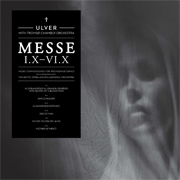An overarching feeling of decadence permeates every single note on Messe I.X–VI.X, and the listener is left with the same unavoidable yet near imperceptible sensation once the album’s last note has ceased reverberating.
This project was originally put together by Norway’s Tromsø Kulturhus, who commissioned Ulver to create new music in collaboration with the Arctic Opera and Philharmonic Orchestra. The band was aided by composer Martin Romberg, whose penchant for folk and fantasy is hinted at by the orchestration during various sections of the album, like the beautiful crescendo in ‘Glamour Box (Ostinati)’ or the faintly audible interaction with the band’s electronics in ‘Noche Oscura del Alma’. The pieces were originally performed live in September 2012, but this finished recording is not a live album in the literal sense, as the music has been reworked and altered by Ulver in the time period since. Nonetheless, Messe I.X–VI.X posed a challenge to the band – which for this recording consisted of Kristoffer Rygg, Ole Aleksander Halstensgård, Jørn H. Sværen and Tore Ylwizaker – who had to tame their inspiration and adapt their groove to the dynamics of a 21-piece ensemble.
During the resulting recording, it’s often nearly impossible to separate the band from the orchestra; their interaction does not make the music, it is the music. During opener ‘As Syrians Pour in, Lebanon Grapples With Ghosts Of A Bloody Past’, for instance, the strings are at first almost a muffled interference rumbling in the background, before they take centre stage for a finale vaguely recalling the religious ambiance of Arvo Pärt’s ‘Fratres’. Indeed, religion feels like a protagonist of the album in itself: Pärt, Olivier Messiaen, even John Tavener (his aesthetic approach, rather than his choral harmonies) and György Ligeti’s a-religious ‘Requiem’, all are re-elaborated and filtered through the group’s experimentalism. As with Ligeti’s masterpiece, you could almost see Ulver’s Messe as a Christian mass stripped of liturgy – something reflected in the lyrics to ‘Mother Of Mercy’, where the entity appears in all her sensuality and earthly compassion. ("Oh mother, mother of mercy / Cradle of all devotion and desire / I turn to you from the valley of tears / Carry me as a child / As a son of man / Bathed in light and precious blood / Filling the cup of the skull of Adam").
The essence of earlier Ulver recordings like Shadows Of the Sun certainly echoes in the background, but at the same time it doesn’t overwhelm the particular atmosphere of Messe. Rygg’s vocals, for example, are confined to the final two tracks, where the ceremony reaches its climax, closing the circle on a challenging work and an album of rare beauty.


